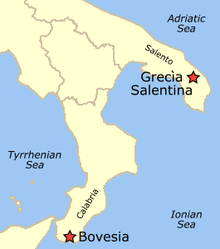Griko language: Difference between revisions
m →See also: rm link to deleted article |
|||
| (One intermediate revision by the same user not shown) | |||
| Line 19: | Line 19: | ||
The Italian [[parliament]] has recognized the Griko community of Salento as an [[Ethnic groups|ethnic]] and [[Linguistics|linguistic]] [[minority]], under the name of ''"Minoranze linguistiche Grike dell'Etnia Griko-Salentina"'' (linguistic minority of the Griko-Salentinian ethnicity). |
The Italian [[parliament]] has recognized the Griko community of Salento as an [[Ethnic groups|ethnic]] and [[Linguistics|linguistic]] [[minority]], under the name of ''"Minoranze linguistiche Grike dell'Etnia Griko-Salentina"'' (linguistic minority of the Griko-Salentinian ethnicity). |
||
==Griko phrases == |
|||
*Ùmme- Yes |
|||
*Denghie- No |
|||
*Kalime`ra- Good Morning and Good Day |
|||
*Kalini`fta- Good Night |
|||
*Stasu kalo`- (to a male), Stasu kali` (to a female), Stasi`te(sta) kali` (to a group) Good Bye |
|||
*Haristo`- Thank You |
|||
*Prakalo`- Please |
|||
*As kalo`- Best Wishes |
|||
*Kalombra`i- Good Evening |
|||
*Kalo`s i`rte- (to a man), Kali` irte (to a woman), |
|||
*Kalo`s i`rtate- (or Kalo`s i`rtato) (to a group of people) Welcome |
|||
==Sample Griko text== |
==Sample Griko text== |
||
Revision as of 15:13, 27 June 2009
| Griko | |
|---|---|
| Κατωιταλιώτικα Katoitaliótika | |
| Native to | Italy |
| Region | Southern, east of Reggio, Salento and Aspromonte |
Native speakers | 20,000 [1] |
| Language codes | |
| ISO 639-3 | – |
| ELP | Griko |
 | |
Griko, sometimes spelled Grico, is a Modern Greek dialect which is spoken by people in the Magna Graecia region in southern Italy, and it is otherwise known as the Grecanic language. Greeks often call the dialect Katoitaliotika (Greek: Κατωιταλιώτικα, "Southern Italian") and sometimes Calabrian, although the latter may also serve as a euphemism for a Greek-Italian pidgin language.[citation needed]
Two small Griko-speaking communities survive today in the Italian regions of Calabria (Province of Reggio Calabria) and Puglia (peninsula of Salento). The Griko-speaking area of Salento comprises nine small towns in the Grecìa Salentina region (Calimera, Martano, Castrignano de' Greci, Corigliano d'Otranto, Melpignano, Soleto, Sternatia, Zollino, Martignano), with a total of 40,000 inhabitants. The Calabrian Griko region also consists of nine villages in Bovesia, and four districts in the city of Reggio Calabria, but its population is significantly smaller.
The most prevalent theory on the origin of Griko is the one by Gerhard Rohlfs and G. Hatzidakis, stating that Griko's roots go as far back in history as the time of the ancient Greek colonisation of Southern Italy and Sicily, in the 8th century BC. In that respect, this Southern Italian dialect is the last living trace of the Greek elements that once formed Magna Graecia. Grico has preserved some Doric elements, characteristic of that early phase. However, its structure is otherwise mostly based on mainstream Koiné Greek like almost all other Modern Greek dialects[2]. Griko and Common Modern Greek are mutually intelligible to some extent.
There is rich oral tradition and Griko folklore. Griko songs, music and poetry are particularly popular in Italy and Greece. Famous music groups from Salento include Ghetonia and Aramirè. Also, influential Greek artists such as Dionysis Savvopoulos and Maria Farantouri have performed in Griko.
The Italian parliament has recognized the Griko community of Salento as an ethnic and linguistic minority, under the name of "Minoranze linguistiche Grike dell'Etnia Griko-Salentina" (linguistic minority of the Griko-Salentinian ethnicity).
Griko phrases
- Ùmme- Yes
- Denghie- No
- Kalime`ra- Good Morning and Good Day
- Kalini`fta- Good Night
- Stasu kalo`- (to a male), Stasu kali` (to a female), Stasi`te(sta) kali` (to a group) Good Bye
- Haristo`- Thank You
- Prakalo`- Please
- As kalo`- Best Wishes
- Kalombra`i- Good Evening
- Kalo`s i`rte- (to a man), Kali` irte (to a woman),
- Kalo`s i`rtate- (or Kalo`s i`rtato) (to a group of people) Welcome
Sample Griko text
from "Kalinifta", a popular Griko song:
Griko
- Εβώ πάντα σε σένα πενσέω,
- γιατί σένα φσυκή μου 'γαπώ,
- τσαι που πάω, που σύρνω, που στέω
- στην καρδιά μου πάντα σένα βαστώ.
transliteration:
- Evo panta se sena pensèo,
- yiatì sena fsichi mou ghapò,
- ce pou pao, pou syrno, pou steo
- stin kardià mou panta sena vastò.
Modern Greek
- Εγώ πάντα εσένα σκέφτομαι,
- γιατί εσένα ψυχή μου αγαπώ,
- και όπου πάω, όπου σέρνομαι, όπου στέκω,
- στην καρδιά μου πάντα εσένα βαστώ.
transliteration:
- Ego panda esena skeftomai,
- yiati esena psihi mou agapo,
- kai opou pao, opou sernomai, opou steko
- stin kardia mou panda esena vasto.
References
See also
External links
- Grika milume! An online Griko community
- Enosi Griko, Coordination of Grecìa Salentina Associations
- Grecìa Salentina official site (in Italian)
- Salento Griko (in Italian)
- English-Griko dictionary
- Rindinedda, traditional Griko song
